Please read below to find out more about the incredible Josephine Bridges who Founded Positive Bones, who provide funding for amputees and those with limb difference so that they can purchase specialist equipment, services and prosthetics that enable and empower them to do the things they love. From prosthetic arms, wheelchairs and trikes to gardening equipment, specialist gym prosthetics and cosmetic covers; Positive Bones has provided funding to many in the limb disability community helping them start, or continue with, the activities they enjoy most.
FIND OUT MORE AND HOW YOU CAN APPLY FOR FUNDING HERE: https://www.positivebones.co.uk/
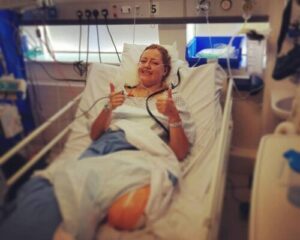
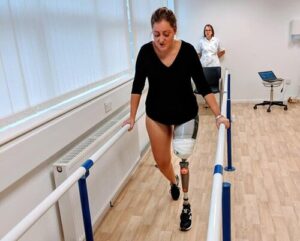
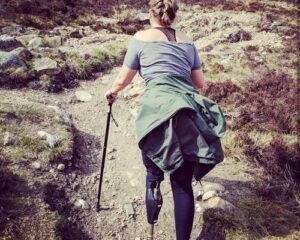
- What’s your name, how old are you? Josephine Bridges, 34
- Who lives with you and how old are they? Tell us a little bit about them what are their favourite colours or hobbies? My husband, he is 33. He is a Quantity Surveyor, a job he loves because it requires logic, structure and numbers as well as community engagement and building relationships on site.
- When did you become an amputee? In 2018. Following bone cancer in 2007 and multiple surgeries over 11 years to try and save my leg I elected to have it amputated as I wanted more opportunity, less risk and more consistency in my life.
- Have you got a name for your “stump”? Tim, the residual limb.
- What was the biggest concern of being an amputee? The future, I have been disabled since I was 17 and I know my body is more worn than it should be, as someone who enjoys adventure, exploring, travelling and outdoor activities I often think how long I will be able to use a prosthesis before my remaining leg or hips becomes too damaged.
- Are you able to work as an amputee? How do you spend your days? I do work, I am a lecturer and course director and was head designer at an architectural practice before that. I spend my days teaching, researching, managing etc. then in the evenings and on weekends I try to get out, walk my dog, hike, kayak, explore and manage Positive Bones. I have always been very fortunate to work for very understanding companies on saying that I do also give my all when I can which means I can go slower when I need to and I navigate between prosthesis, wheelchair or working from home to best suit my needs which means I am rarely slowed by my disabilities.
- What’s been the biggest challenge you have had to overcome and how did you overcome it? Phantom Pain. I have some very severe phantom pain, as do many amputees, it never stops, it is 24hrs and it’s constant agony, I have been told this was because I had been in pain for many years prior to my amputation. In the first few months following my amputation I rarely slept, I could not rest, the pain was all consuming and entirely overwhelming. At the time I put a brave face on but inside I was crumbling as a person. I had expected to come through my amputation as strong as I had come through all my surgeries but the pain was unexpected and I was totally unprepared, I began to doubt myself, my strength, my ability and my future. It was at my 6 month check up that my surgeon noticed I was a shell of the person I once was and he immediately had me signed up to a therapist. I was diagnosed with depression and began therapy, it was a therapy that helped me manage my pain most but it was fundraising and knowing that I had this amazing leg with all its opportunities coming my way that helped my depression most and ultimately, kept me going. I am still in pain nearly all the time but have learnt to live with it and navigate it, I know its triggers, I know how to keep myself calm and how to move it into background noise most of the time. I now enjoy life at the maximum and i feel very lucky to have to got to where I am. *I would like to add, my case is very rare, most amputees find their phantom pain does ease over time, mine it just hanging around for longer than the typical.
- What’s your family’s favourite thing to do? We all love the outdoors so as a family we are often found hiking, kayaking or exploring followed by a few pints in the pub
- Have you got any funny memories that have happened since your amputation? Many, but the best one was in Palma, Spain. I was cycling the coast with my mum in the boiling heat and we were passing various holiday goers, stag do’s and hen do’s on the main strip by the sea when my leg fell off! It took me a while to stop as we were going at some pace and I didn’t want to fall off my bike now that I had no left leg to stabilise me so for a moment I was just dragging my prosthetic behind me as the revellers in the local bars looked on.
- When did you come across Steel Bones? What does Steel Bones do for your family? I came across steel bones at the very start of my journey, before my amputation, when I was exploring whether I should have one. I emailed to ask some questions and was invited to one of the family days. It was doing this that helped ease so many nerves I had felt, I was able to speak to lots of other amputees and really get a perspective on what my life would be like post-op. It was the best thing I could’ve done at the time and I am so grateful to Steel Bones for their kindness and service.
- What would you most like to achieve? Small or big is there one thing you hope to accomplish? I would love to run Positive Bones full time, I would like to help as many people with limb disabilities as possible get the chance to access equipment that would help them do what they love most, with relative ease. That and I still hope, one day, to become a professional kayaker.
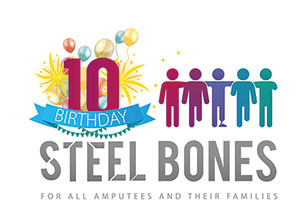
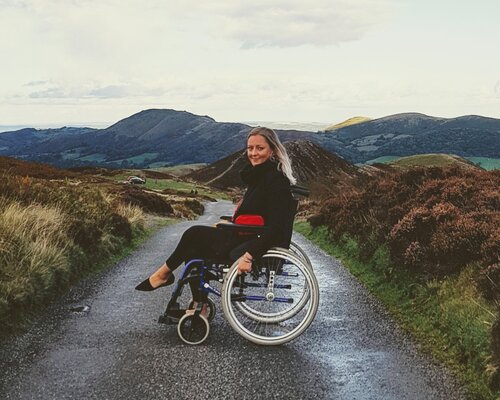
I am nearly 67 years old . When I was nearly 19 I had a serious motorcycle accident I broke my left femur . I hit a car and broke leg on handle bars of bike . After I landed on floor I tried to stand up . Unfortunately I then suffered siatic nerve . I struggled on with a useless foot till 1989 . I had had enough of ulcers on foot and antibiotics . So it was decided to amputate left foot at ankle and fix heel bone on bottom of leg . Which went ahead on 28 October 1989 at 8.20am I’m the morning . Since then I learnt to swim and achieved my 25 mtrs . Did Judo gor a few years . I went to motorcycle show in Birmingham and met up with NABD national association of disabled bikers . I joined them and eventually bought a honda 250 motorbike . Then I progressed to a Suzuki 550cc which I applied gor a grant to have an electronic gear changed fitted. Which was successful. Unfortunately later on I purchased a newer better bike a honda vt500 then transferred gear change unit to that. Then in 2008 I let my father and he left me alot of money which I purchased my dream bike a harley davidson 1340 cruiser which I rode for a long time but in the end I came off it and decided to give up motorcycles and sold it which I regret . I joined steel bones . Unfortunately I won’t be able to attend any events so shan’t be joing any events